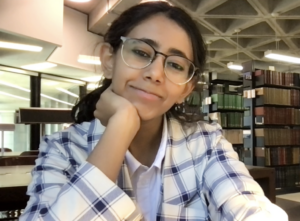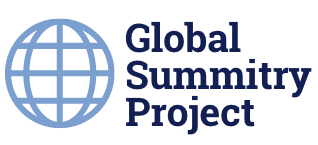
Khaleda Khan
Khaleda Khan is a journalism student at the University of Toronto and Centennial College. She has previously written for a Canadian youth magazine, a digital arts publisher, and various news organizations at her university. Khaleda partnered with the Global Summitry Project as part of Centennial College's experiential program in 2023.
In her free time, she enjoys writing, listening to music, and reading literature from different languages and cultures.
Angela Minyi Hou enjoys learning languages, reading, and listening to music from different cultures. She is also passionate about global summitry, trade and sustainable development, and was recently introduced as the Head Delegate for the Young Diplomats of Canada at this year’s Youth 20 (Y20) summit in Varanasi, India in August.
Hou, now 25, began her engagement as a Young Diplomat of Canada (YDC) because she was interested in exploring how she could contribute to youth engagement and bring the voices of Canadian youth to a global stage. She first joined the Young Diplomats when she was the head delegate (HD) for the World Trade Organizations’ (WTO) public forum delegation in 2021, and had a specific interest in trade as her specialization from her master’s degree.
Throughout her undergraduate years at the University of Toronto, Hou was involved in its G20 research group — which she says continues to inspire her to this day as a senior researcher for the Canadian government. She said she joined the YDC for numerous reasons including to develop research, consultation and negotiation skills.
“I’ve always been interested in summitry and always jumped on the opportunity to have a negotiating presence,” she said in an interview. “A second reason is … text-based negotiation that I wouldn’t otherwise get. And the third is, of course, a passion for engaging Canadian youth and really bringing their voices into a negotiation table.”
As a Head Delegate, Hou is the spokesperson for the Delegates with the YDC executive team, and at meetings with important stakeholders at Canadian and foreign summits, embassies, and other such institutions. Her roles also include organizing pre-summit conference calls and managing other administrative requirements for delegations attending summit meetings.
She is also the negotiator in the “Future of Work: Industry 4.0, Innovation & 21st Century Skills” track to be presented at the Y20 summit in August.
The Young Diplomats of Canada is a non-profit organization that trains and develops young Canadians passionate about foreign policy and international relations. The group is led by volunteer youth leaders who represent young Canadians at international events that call for the ideas of young people around the world, such as this year’s Y7 hosted in Japan, the Y20 in India, and the International Monetary Fund Annual Meetings, and more.
“Young people are so underrepresented in decision-making processes in discussions about these issues,” Hou says. “This [underrepresentation] is evident in the panels that we attend, or the representation in terms of age is always skewing towards more senior experts. So to me, it is really enlightening to get to see where expert opinions can inform your thinking and where your thinking could fill in the gaps of current discourses and ongoing debates that don’t consider us as a demographic,” she says.
On April 4, the Young Diplomats of Canada officially announced the diplomats representing Canada as the official Y20 Delegation at this year’s Y20 summit. Alongside Head Delegate Hou, the team comprises Diversity and Inclusion Coordinator Laurence Leblanc, Communications Coordinator Aubrey-Anne Laliberte-Pewapisconias, Engagement Coordinator David He, and Delegate Linxi Mytkolli as Canada’s young voices at this year’s G20 Summit.
The G20 (or the Group of 20) is a group of nations that works toward shaping, governing and encouraging development in major international issues, especially global economy, and works mainly in two tracks: the Sherpa Track and the Finance Track. While the tone of the Sherpa track is more socioeconomic, it focuses on civil developments in education, employment and trade, health and agriculture, to name a few. The Finance Track zeroes in on global inclusivity in finance and health, international tax, global economy regulation, and the infrastructure. [a bit vague – ASA ] .
Leaders with the G20 also interact with various Engagement Groups — groups of non-governmental participants from each country who bring together civil societies (C20) think tanks (T20) , women (W20), youth (Y20), labour (L20), business (B20) and more. According to its background brief, each of the Engagement Groups represent the general civil society and works with other organizations from G20 nations to discuss and develop policy recommendations, which are then formally submitted to the heads of state for review and consideration.
This year the G20 is being hosted by India with the Leaders’ Summit in September. Its overall theme is Vasudhaiva Kutumbakam—or One Earth, One Family, One Future. This year’s Summit action areas include:
- Future of Work: Industry 4.0, Innovation & 21st Century Skills,
- Climate Change and Disaster Risk Reduction: Making Sustainability a Way of Life,
- Shared Future: Youth in Democracy and Governance
- Peacebuilding and Reconciliation: Ushering in an Era of No War,
- Health, Wellbeing and Sports: Agenda for Youth.
India will organize over two hundred meetings from G20 Ministerial meetings, to G20 Task Force and Working Group meetings, as well as many G20 engagement meetings.
Head Delegate Hou says that the pre-summit meeting will take place in late April, and delegates are now developing policy positions. She is thinking about equity and access to digital infrastructure as part of the Future of Work track.
“I’m concerned about how to prepare Canada’s young people for 21st century job opportunities … for entrepreneurship,” she says.
Hou identified some of the issues based on priorities provided by the Indian host, including environmental shifts putting certain industries out of business, the role of immigration in labour shortage issues, gender inequalities in the workforce impacting young people, and what the solutions may be.
“So we look forward to consulting policymakers, NGOs, researchers, youth groups, etc., to get a sense of these answers. But so far, we’re at the early stages of really exploring how Canada can bring solutions to the table,” she says.
Iknoor Khaira, another Young Diplomat assigned to the 2023 Commission on the Status of Women, says that as a youth leader and advocate, success is measured by the changing nature of conversation, which, she admits, is hard to measure on the global scale.
Khaira, 21, is pursuing a Joint Honours BA in Philosophy and Political Science at the University of Ottawa. She spends a lot of her free time volunteering with NGOs and is committed to the advocacy and advancement of gender equality and women’s rights.
When she was a Young Diplomat in 2022, she prioritized making sure that a lot of these perspectives are addressed in these spaces at the United Nations’ 67th Session for the Commission on the Status of Women (CSW).
“I hope to see [success] being measured in ways of increased rates of economic inclusion of women and girls, more representation and leadership, [in] more concrete ways later on,” she said in an interview.
She measures success from the work that she has done so far: “Just getting out there and having those conversations and hearing how empowered women and girls feel knowing that their issues are making it there and [also] how that’s changed the level of confidence they have in entering these spaces.”
Khaira says that the most rewarding part of being a Diplomat was the contributions she added to the global conversation in her track on advocating for gender equality. “Just knowing that I’m part of a movement to make sure that these voices, these issues, are finally making it to these spaces — when I was selected as a young diplomat, a lot of the work was garnering an idea of Canadian youth perspectives and bringing that to the table.”
In her position as a Diplomat at the CSW, Khaira says that one of the challenges was making sure that the youth perspective is prioritized.
“In a lot of spaces like this, there’s still quite a bit of marginalization of youth voices, which is even more of an issue considering that young girls are the most vulnerable group in society,” she says. “So we’re still on this momentum of ensuring that youth voices are provided as much representation in these spaces but there’s still quite a bit of a way to go for that on a world scale level.”
Head Delegate Hou has also bumped into a few challenges as a Diplomat and working in a diverse group, especially in the case of the Y20 negotiations:
“We have delegates from all of the G20 countries. And of course, they come from a variety of economic structures, political systems, personal backgrounds, and getting everyone to align on priorities is very challenging,” she says.
The Future of Work, she mentions in an example, affects each country very differently as a developing or a developed economy, alongside other factors.
“Given the ongoing geopolitical crises, your positionality is obviously very important. So there are many factors that inform the delegates’ opinion. And it’s all about getting to understand that position and work with that position. But by no means is that easy.”
Once the Delegates develop their ideas, they adopt them by consensus and then draft them into recommendations for policy proposals and changes. These proposals are then negotiated with representatives of other nations and they discuss creating a consensus on the outcomes around the proposed solutions, Hou explains.
After the rigorous negotiations take place, a Y20 communique — an official media statement — is made accessible to the public. This document is then transmitted onward to G20 leaders for their consideration.
Read last year’s Y20 communique hosted by Indonesia here.
But for Hou and the other delegates, the communique is only halfway through the engagement rather than the end. Then the Diplomats take the outcomes and advocate for them in a domestic context.
“For us young delegates, we take the outcomes and continue to work with our experts, our community leaders, our policymakers to implement and to improve on the policies we have in our country,” Hou says.
“And so we don’t see the communique as the end product per se, but as rather a milestone for further advocacy in our domestic system.”
Interested in learning more?
See the related social media post on the Global Summitry Project’s Instagram at https://www.instagram.com/p/Cr5xbAUOCOA/?igshid=MzRlODBiNWFlZA==
